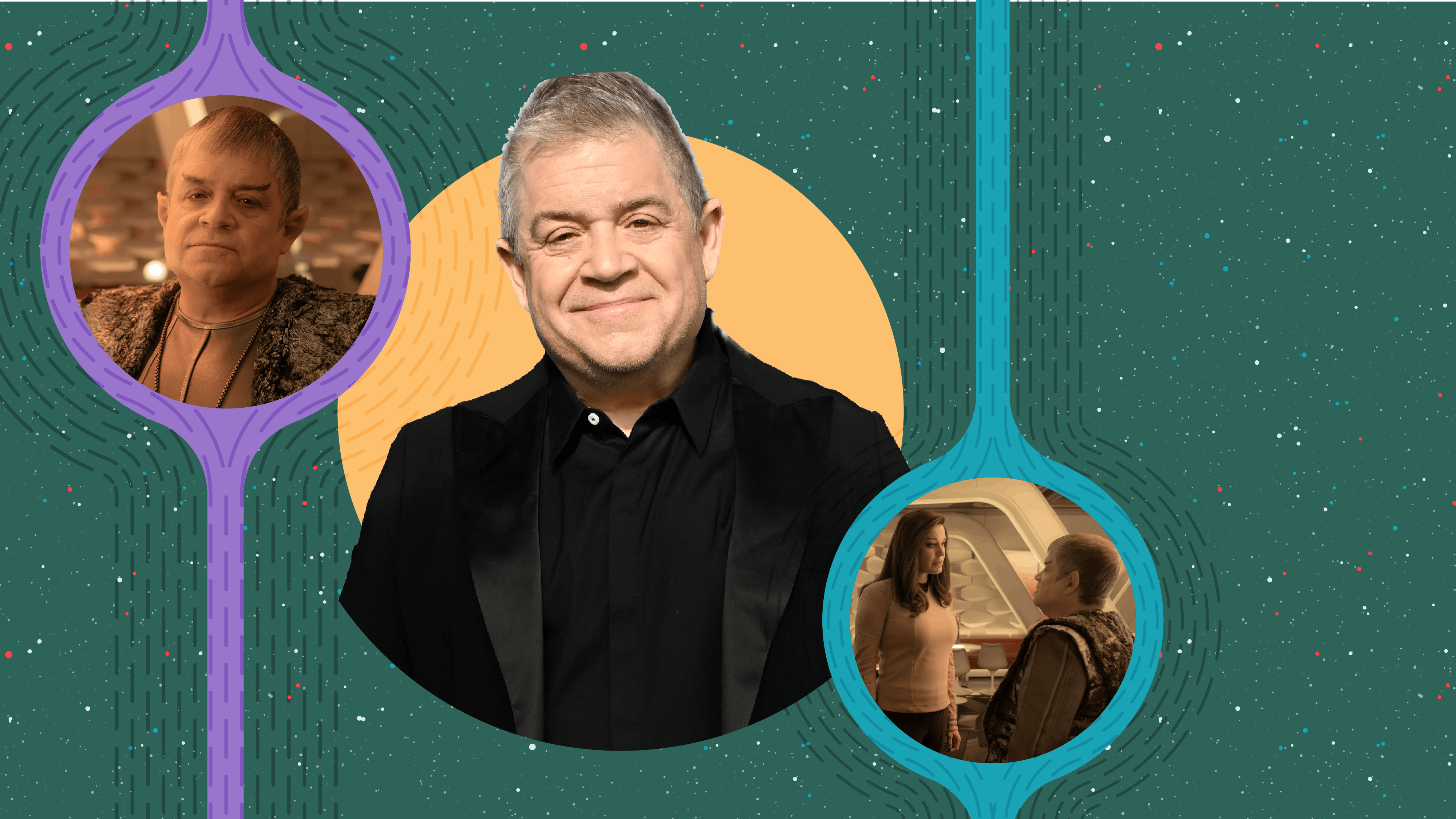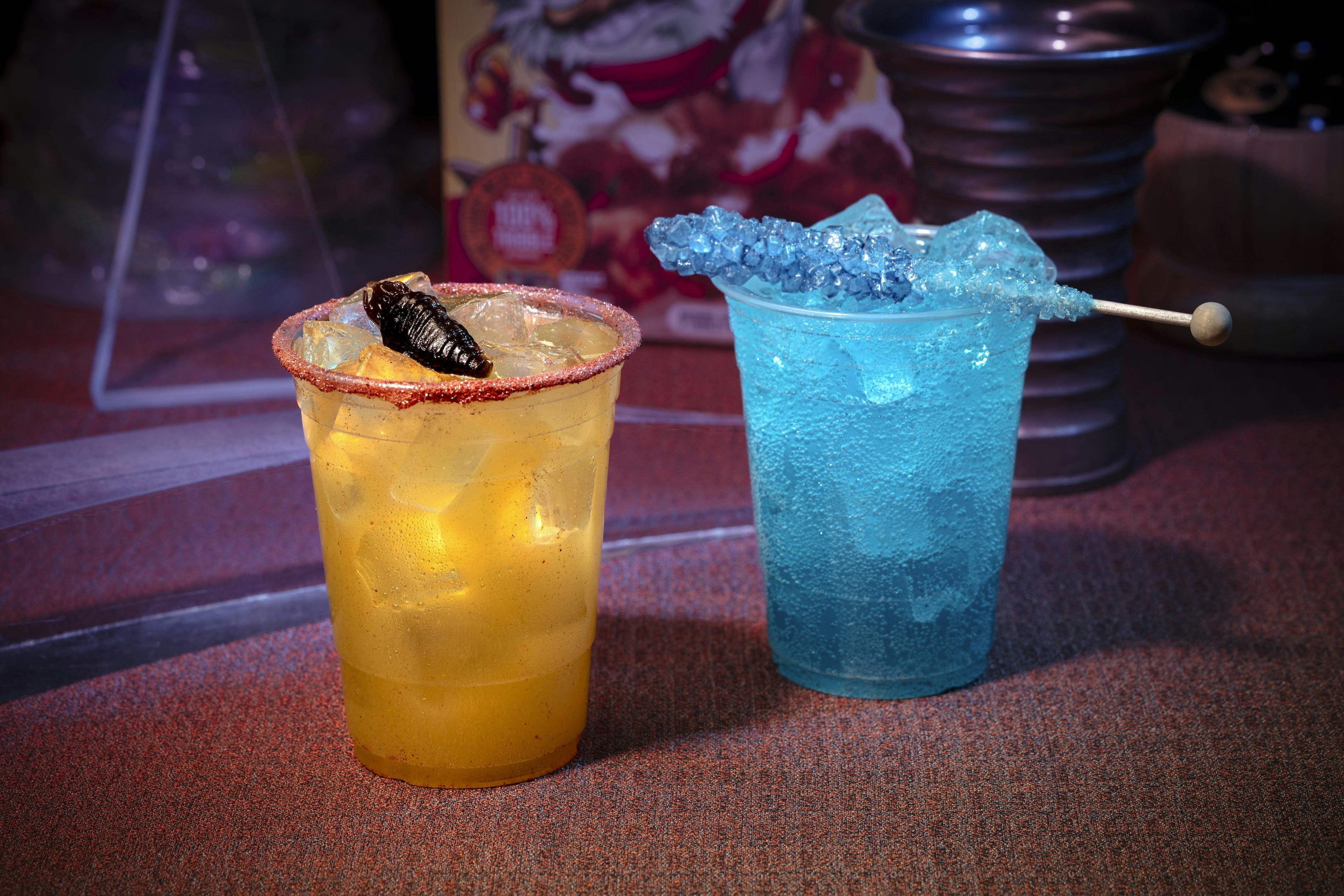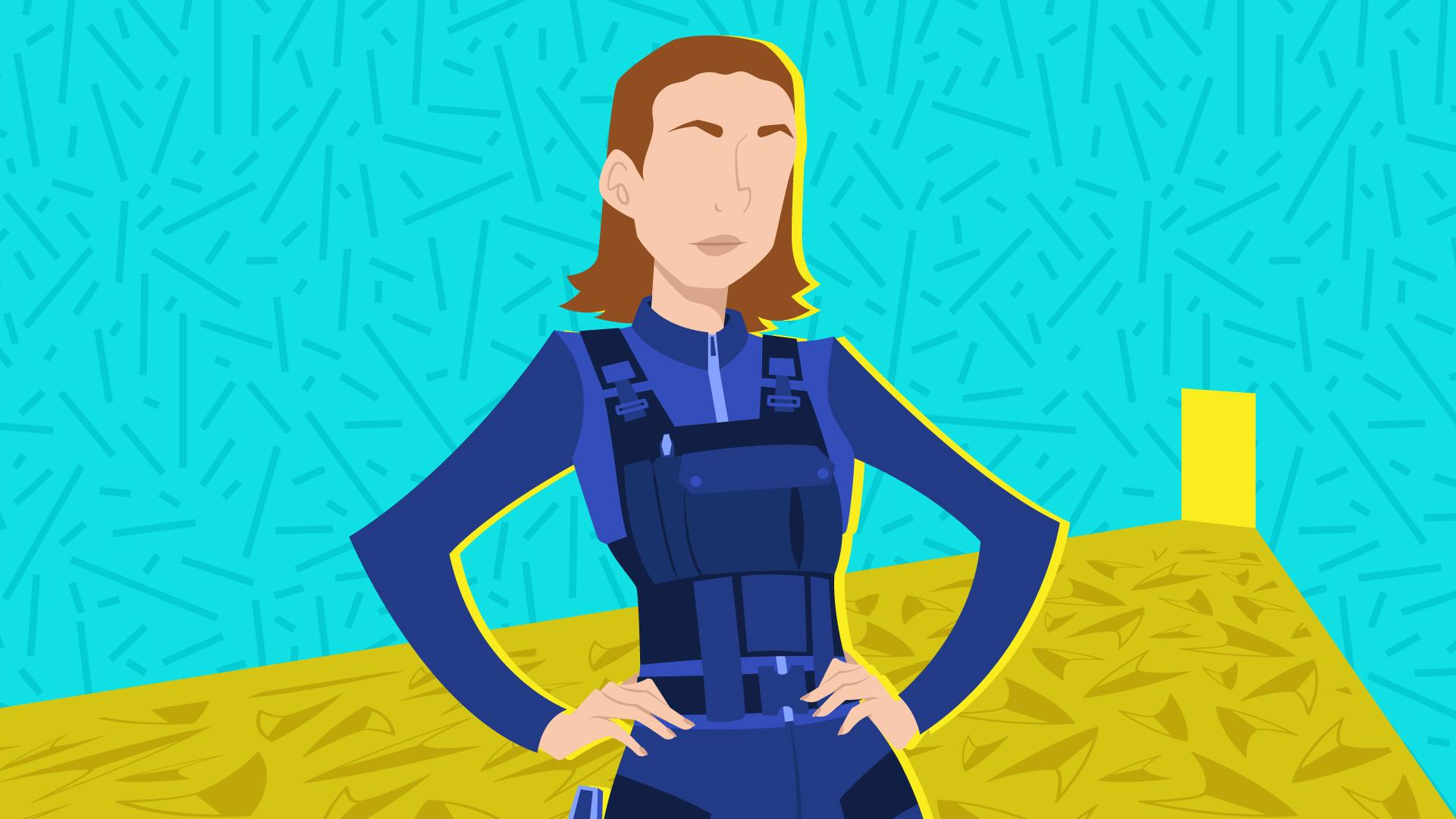Published Aug 10, 2021
Below Deck with Lower Decks: Mike McMahan Breaks Down Season 1
The series creator sits down with StarTrek.com to talk all things Lower Decks!
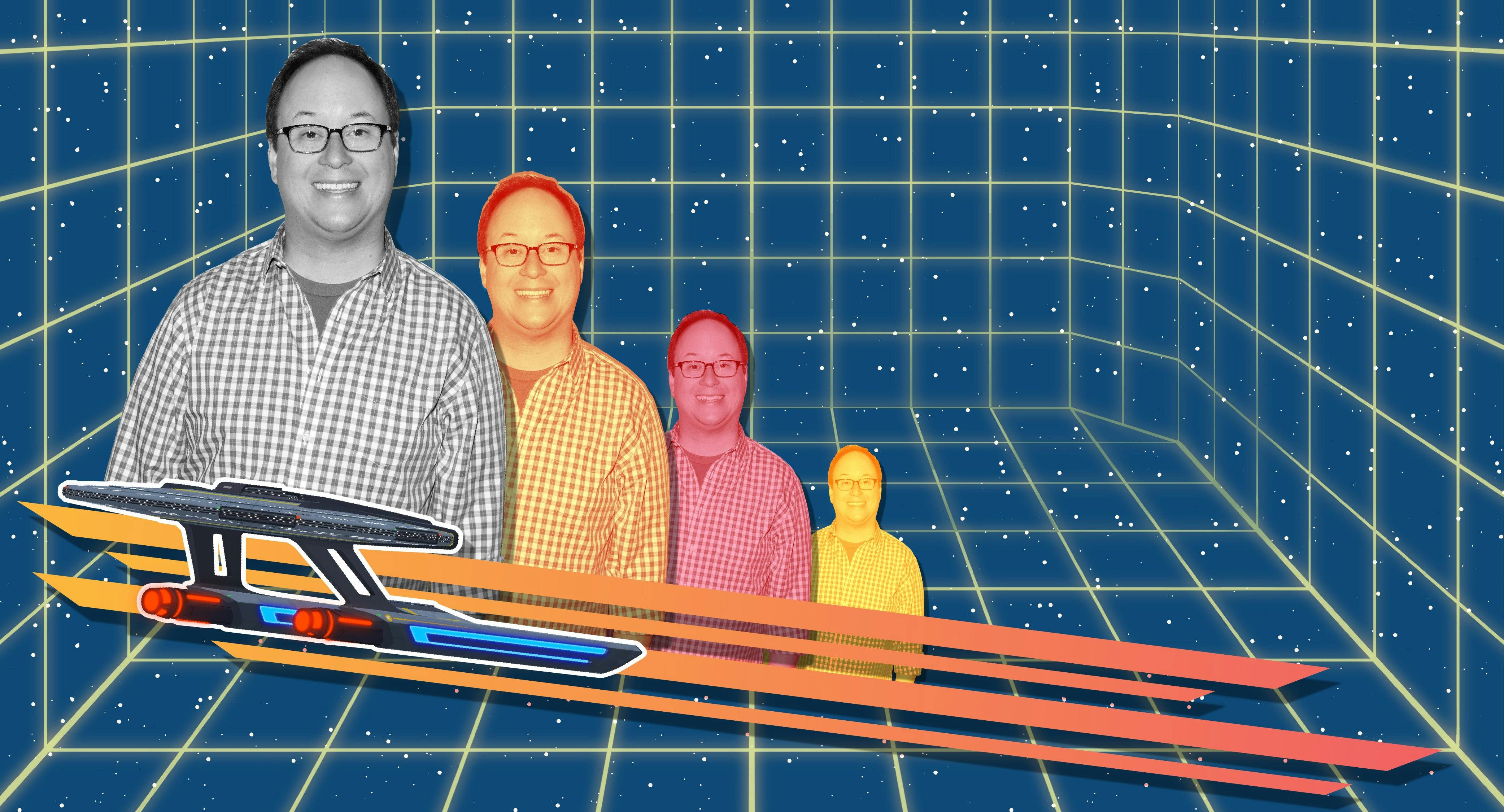
StarTrek.com | Getty Images
creator Mike McMahan has gone from running a Star Trek fan account (@TNG_S8) to living the dream of writing his own Star Trek series. Lower Decks just wrapped up its first season with an action-packed finale that was a fan’s dream come true. The episode had cameos from fan-favorite characters, dramatic sacrifices, and, of course, some big changes that set the stage for Season 2.
For this week’s Below Deck with Lower Decks, we sat down with McMahan to talk about the finale in a spoiler-y chat where he answers our burning questions from the finale and look ahead to the future of the U.S.S. Cerritos.
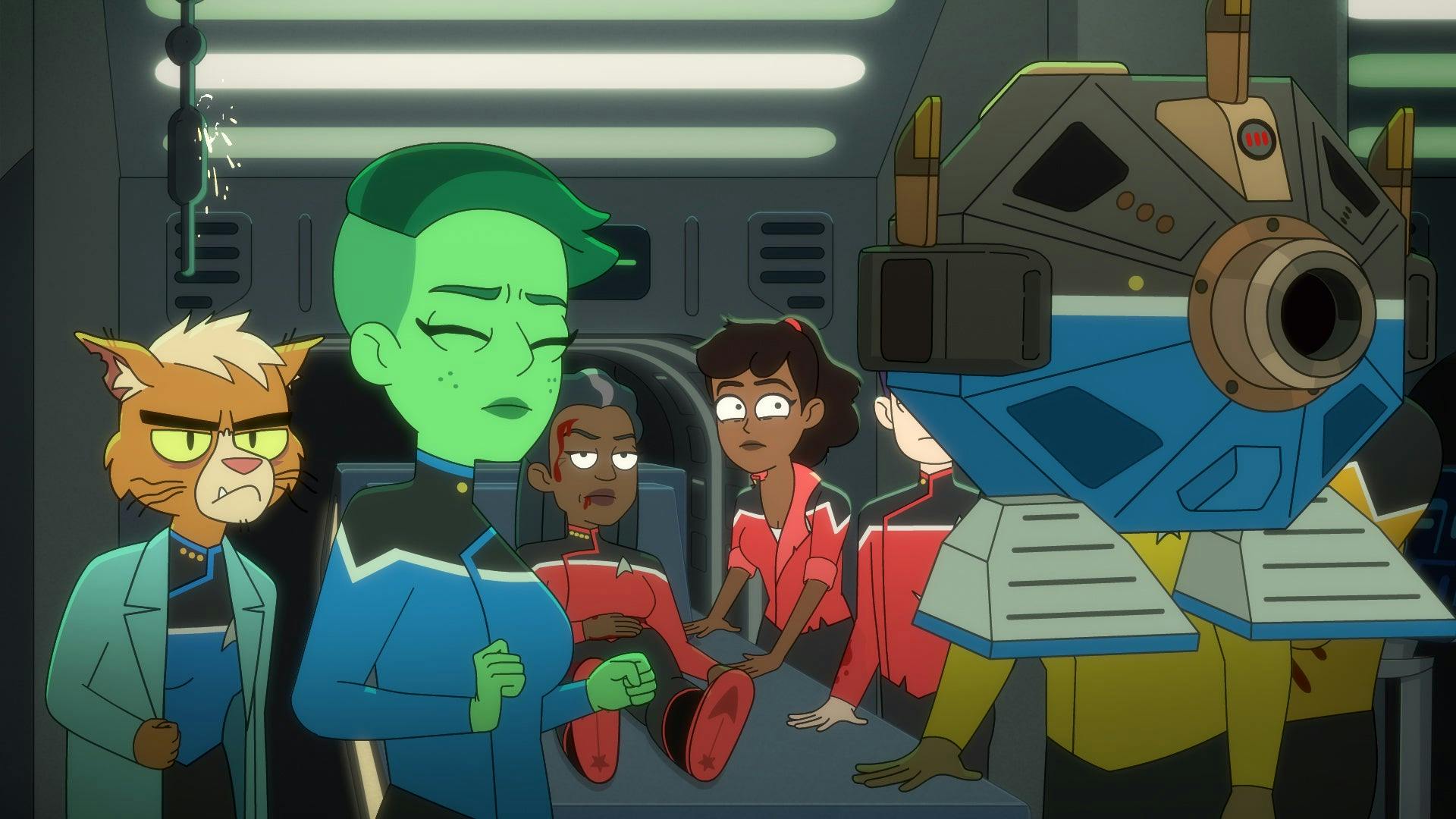
"No Small Parts"
StarTrek.com
StarTrek.com: Let's start off with an easy question, which is about Easter eggs. What was your favorite Easter egg to include in the first season, and are there any Easter eggs that you've included that fans haven't spotted yet?
Mike McMahan: I would say there's probably a billion Easter eggs. I think that's the typical number. It's hard to pick a favorite, because we don't really consider them to be Easter eggs while we're doing them. It's just texture and details that we love. I think maybe my favorite, favorite Easter egg is so silly and nobody else will care, but that the registry number on the Cerritos is based on my mom's phone number.
I don't know if you guys can say this — I'm actually not sure if we're allowed to say this — but my sister's name is Beckett Mariner McMahan, and so I was able to use her name as the lead character on the show, which I've always wanted to do. I don't think that's ever been publicly out there. My mom loves to watch the show when the captain goes, "Beckett!" because she thinks it's so awesome.
StarTrek.com: This show is full of original characters — what is the process of bringing new characters into the Star Trek universe, and how do you make them unique while still including familiar Trek archetypes?
Mike McMahan: It's kind of a balance. I think we talk a lot about “what does it mean to be in Starfleet, what does it mean to be in Starfleet in the 2380s?” Not only just like what department you're in, but also what type of person you are in that department, what type of person you are if you're a lower decker versus a bridge crew officer and not on the best ship, and really, what are the areas that we like to tell stories about?
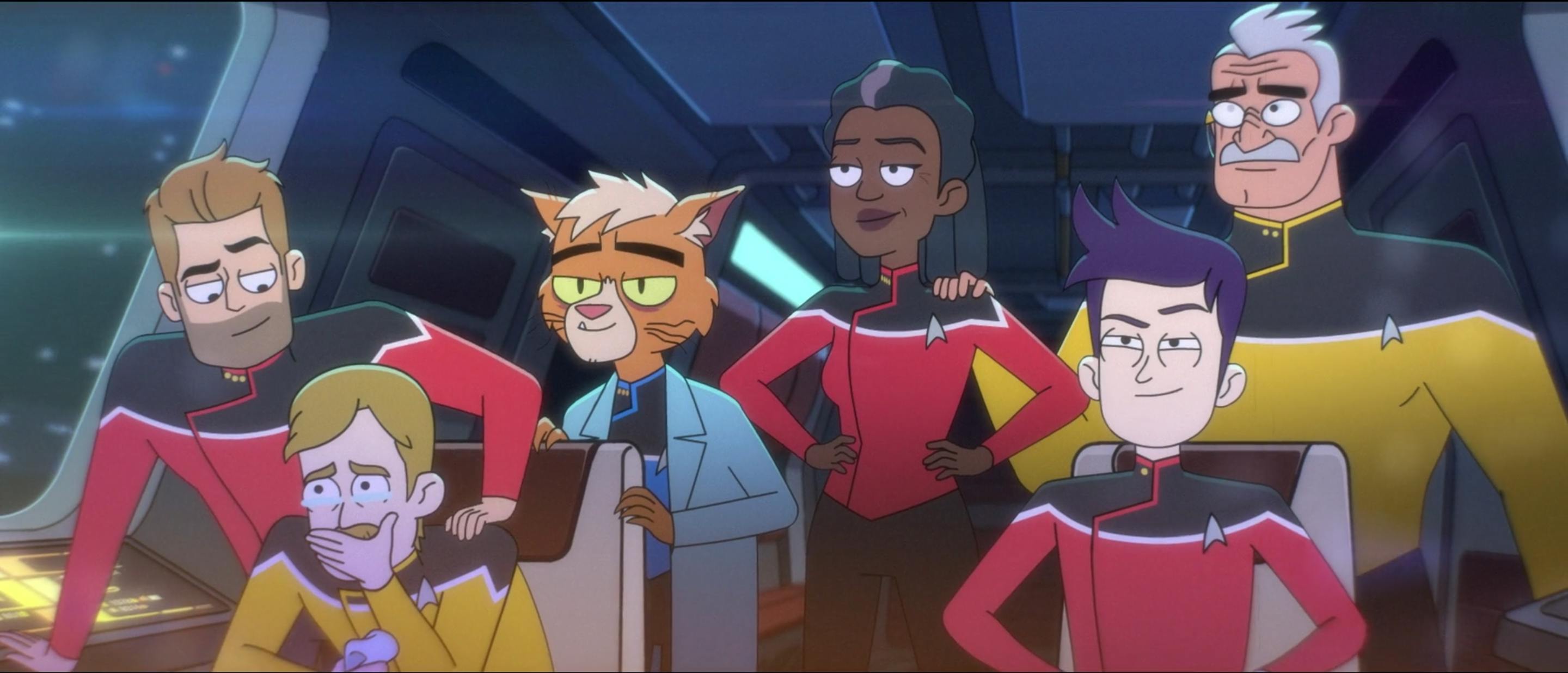
StarTrek.com
I think that's a thing that Star Trek ... For me, Star Trek, the best element of Star Trek isn't the morality play, the metaphors for the aliens. It's the friendships that you see on the different Starfleet ships. So, a lot of the times we're building characters and it's what kind of friends would these guys be? Why would these guys go to the mat for each other? And that's kind of what we're doing.
StarTrek.com: Speaking of legacy characters, there are two very important guest stars in the finale. When did you realize that you wanted to bring those characters into the show and will they be making more appearances in the series?
Mike McMahan: [laughs] I assume you're talking about Exocomps and the Pakleds. Now, you're lucky I'm going to tell you... You mean Riker and Troi?
StarTrek.com: Absolutely.
Mike McMahan: Definitely we'll be seeing Riker again. I mean, Boimler's on the Titan. Next season when we come back, there [won’t be] a big time jump. Boimler is serving on the Titan. That's something that he talked about all season one, and we're going to see sort of what it's like for him to work on that ship. And then we're going to see what it's like to work on the Cerritos without him.
So, that's not something we're tossing away. You're going to be able to see that on the show, and of course, because you have the Titan, you're going to have Captain Riker there.
StarTrek.com: Without spoiling anything for Season 2, can you hint at any other potential fan favorite legacy characters making an appearance in Season 2?
Mike McMahan: I can't, but there will be. And they'll come in a way that you don't expect.
StarTrek.com: With Shaxs having joined the prophets at the end of Season 1, can you hint at who might replace him?
Mike McMahan: We have a very awesome new head of security. I love Shaxs and those are very big boots to fill, and the person that replaces Shax is completely unlike Shaxs, but they're a member of Starfleet. It really pains me that we've lost Shaxs, but I think the person who will be heading security will be somebody that fans are really interested in.
StarTrek.com: Rutherford got quite literally rebooted in the finale. What changes can we expect to see with his character now that his memory has been wiped for season two?
Mike McMahan: For Rutherford, that's really tough. When we start, he finds out then somebody sacrificed their life to save him, and then he finds out that Tendi was his best friend. He basically lost his memory, we'll find, up to right before the pilot of Lower Decks Season 1, so there's a lot of self-doubt happening with Rutherford and there's a lot of kind of competing with who he used to be.
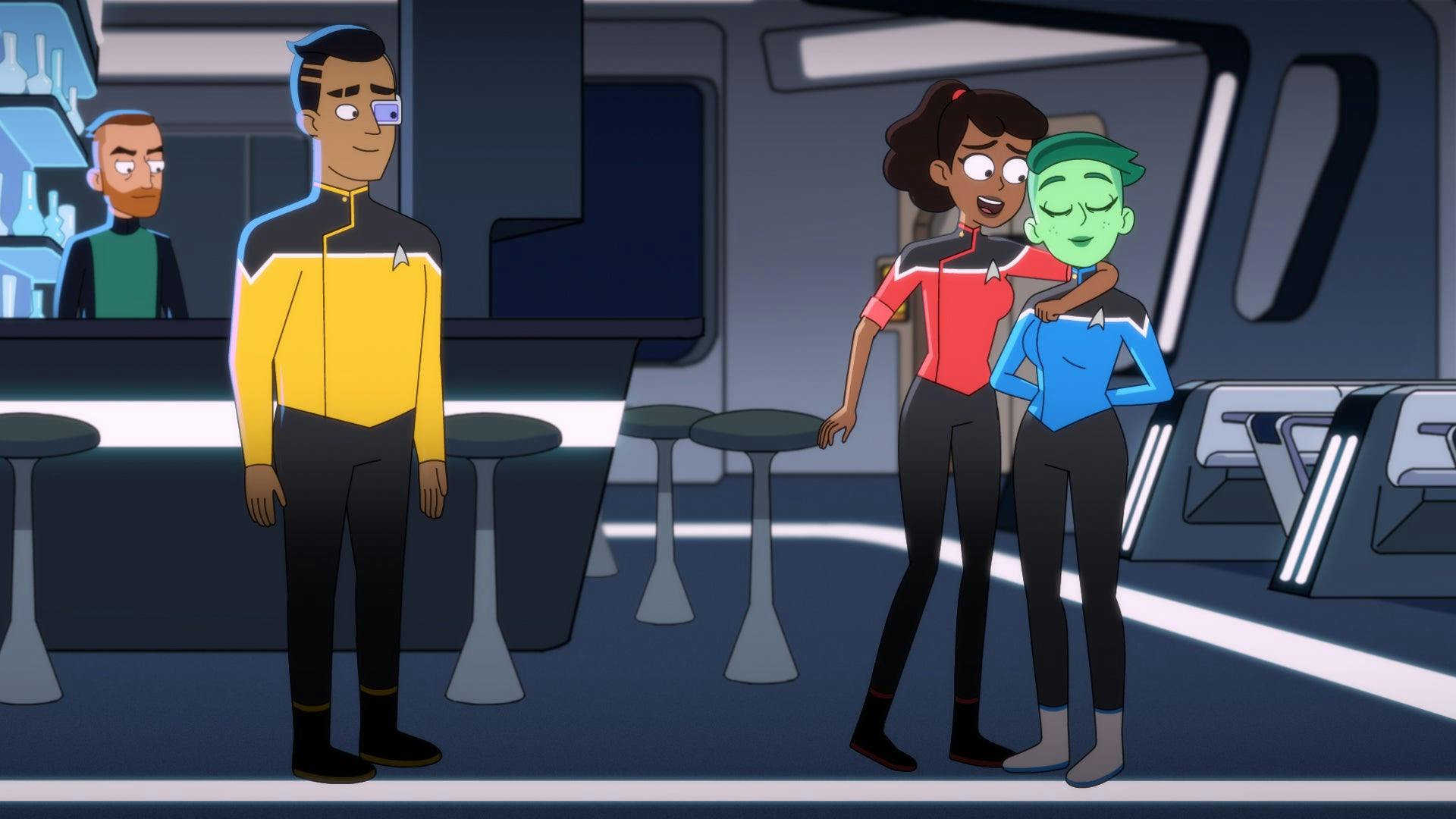
"Crisis Point"
StarTrek.com
Like, do people like him, or do they like the guy that they had all of these experiences with the first season? You'll be seeing how that plays out emotionally and what it means when you're an engineer.
StarTrek.com: The emotional core of Mariner's journey is her relationship with her mother, Captain Freeman. We haven't really seen a key mother-daughter relationship be this central to a story in a Star Trek show before, so what inspired you to make that Mariner's emotional journey and how will it develop in Season 2?
Mike McMahan: Well, I don't want to say too much on Season 2, but what inspired me, I think is as I was writing Mariner, her character kind of came first. I knew that I wanted Captain Freeman to be this stoic and this classic-feeling Starfleet captain who maybe wasn't the best of the best, but when it came down to it, she did a really great job. As I was writing the pilot, I knew that I wanted Mariner to be this chaotic force.
Growing up, my mom and my sister got in a lot of arguments. They love each other at the end of the day, but my mom was kind of a captain. Nobody gets under their mom's skin more than their kid. It's like they just know them so well, so I just wanted to take that energy, because it's just great for comedic friction to have that.
And then on top of that, [in the] first season you have the secret, they don't want the rest of the crew to know that this is happening. They're keeping it private. And then obviously in the finale, it comes out. So, second season, the direction is more "Okay, the secret out," but now that they have decided to work together, what does it mean when you have to really work with your mom or your daughter and how is that hard?
It's a different shade of what we saw [in the] first season where Mariner was throwing it in her mom's face all the time. Now Mariner is challenged to put her money where her mouth is and actually do the things she said she wanted to do.
StarTrek.com: This show functions as both a love letter to Star Trek and a love letter to Star Trek fans, so how did you make sure that you approach each episode from a place of affection and avoid punching down, either at the franchise or the fans?
Mike McMahan: Well, part of it is just instinct, because I love Star Trek and I just didn't have any interest in making a structured show that was mocking Star Trek. I also just felt so lucky that I was going to get to make any Star Trek at all. This was my chance as a comedy writer, to be able to do a show that felt like the kind of stuff that I liked to see in Star Trek.
But also on top of that not just being me, there was a whole host of writers and producers on the show that were constantly asking these questions, that were saying, "Okay, it's funny, but is it Star Trek?" Sometimes we'd get into a conversation and it would be like, "Well, you know, really could there be somebody..." Like if there's an episode where somebody, like if there's an officer on another ship who's just not great at their job. And it's like, "Okay, are there examples in existing Star Trek episodes of those kinds of people?" And as long as there were, as long as they felt right and they didn't feel like outliers.
We have this character Fletcher where he's kind of like our dark version of Barclay. Barclay was not a great officer, but then when everybody came together and believed in him, supported him instead of being frustrated by him, he was able to find his path. Fletcher is the opposite, not able to do that with the people supporting him and try to work with them, which is why he ends up not in Starfleet at the end of the day.
So, in a million little ways, every single episode, there was a constant understanding of, yes, this has to be funny, yes, this has to be vibrant, but if it doesn't feel like the states and it doesn't feel like the character dynamics and the storytelling, if it doesn't feel like Star Trek, then it's not really worth doing. Just... when you're writing it and crafting stories, you take a bunch of ideas and then you whittle down and you whittle down and you find the ones that are just right.
StarTrek.com: Star Trek has this incredible 50 years legacy. What is it like writing a new chapter of that legacy?
Mike McMahan: I mean, it's insane. It is something I never thought I was going to get to do and it's something that every day is the hardest writing I've ever had to do, but also the most fun. It's the kind of thing where when you're writing it, you don't think of it as disposable. You think of it as this is something that I want somebody to watch over and over and over again, and I want them to watch it when they have kids or when they are kids.
Star Trek is evergreen. To me, there's no bad series of Star Trek and there's no really bad episode of Star Trek. Because even in a "bad episode," you're still getting to hang out with characters that you love, and that's what we're trying to create with this is Starfleet characters that you love. The show might not be for everybody, but for the people that it's for, you just want it to feel like when they watch it they can just sigh and be like, "Oh, I'm in that world. I'm in the Federation. I'm in the Alpha Quadrant. I'm just there for 20 something minutes".
And even if the way that we express it is maybe a little bit faster, louder than the other Star Trek shows, it's important that you still feel that welcome home vibe when you're watching it.
StarTrek.com: Absolutely.
Mike McMahan: I don't know. It's fucking crazy.
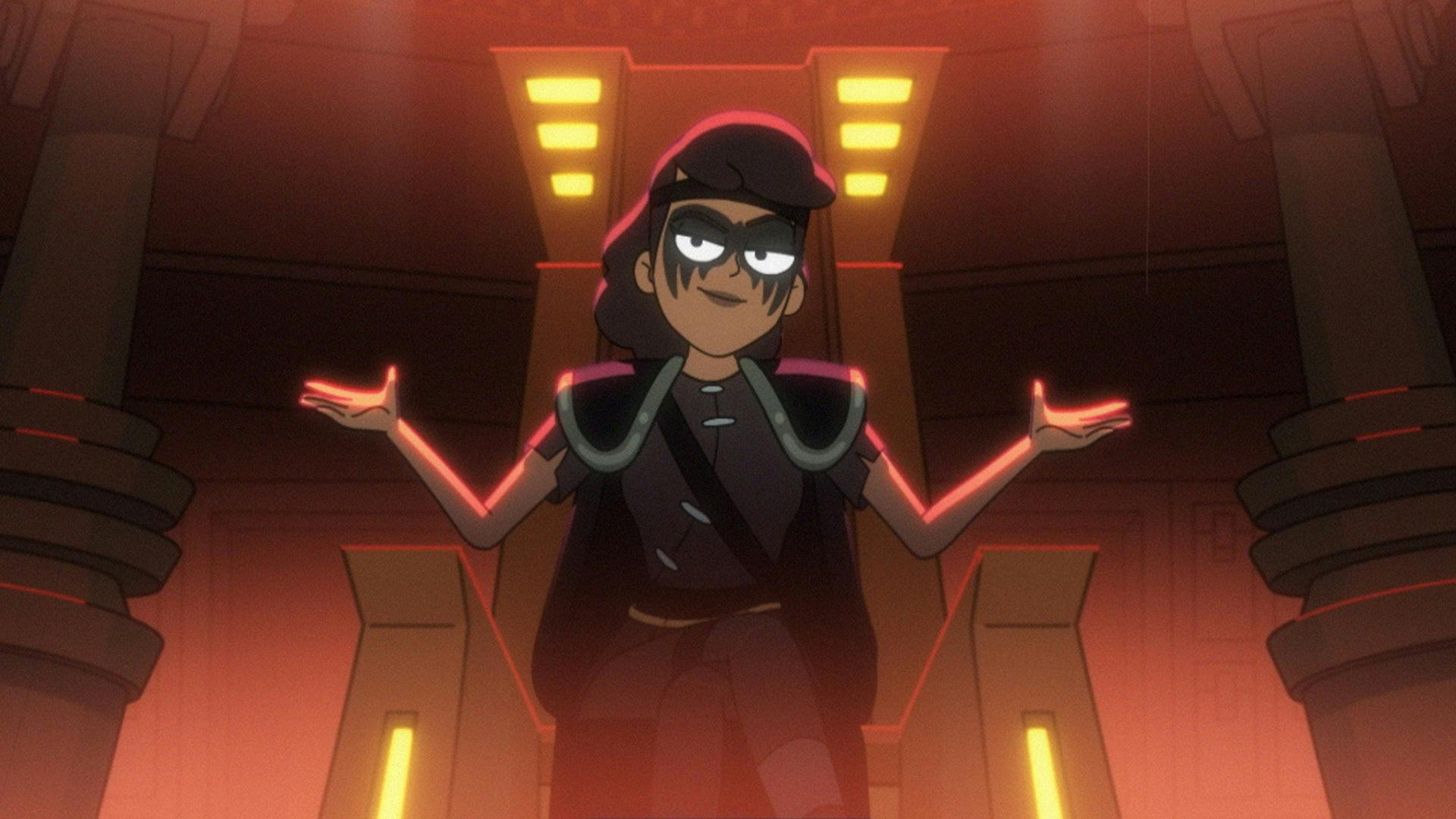
"Crisis Point"
StarTrek.com
StarTrek.com: Episode 9’s central thesis seemed to be that therapy and working through your issues is incredibly important in terms of being able to move forward, and it's also this incredible homage to the Star Trek movies. What inspired that particular episode?
Mike McMahan: I knew that I wanted to do something that felt like a big, kind of classic Marvel Comics sort of story. I knew I wanted to do a big holodeck movie episode, I wanted to have a lot of movie tropes in it. I had gone through a phase where I'm like, "No, I don't want therapy!" I think that there's a lot of times where people look at therapy and they're like, "That's an attack on me," right?
And you have to kind of have a relationship with therapy to be able to say, "Oh, therapy, it's a part of a mental health regimen that's good for you," like any doctor would be. And just like any other doctor, you have to find the right therapist. So, seeing Mariner go to the ship therapist, who is not great at his job, and then having all of this pent up kind of rage and taking it into the holodeck and then literally coming up against herself, like a holodeck recreation of her from her writing. The version of herself that she puts on the page knows her better than anybody else, and then she's able to literally hash it out with herself. She's going into the holodeck clearly to fight her mom and then ends up actually fighting herself, which is really what needed to happen.
And then coming out of it at the end, not only with the audience literally getting to hear and see these things played out visually, but also having Mariner having seen it and then getting to go forward and arming her with the change that she needed to be open to kind of understanding that, that she doesn't have to have this chip on her shoulder. It felt like a way to do a really fun episode, but a way to take a character and allow them the ability to be open to change. It might still happen slowly, she might still not be perfect, but at least she had that breakthrough. It was just fun.
StarTrek.com: Before we go, any last teases about Season 2 that you can share?
Mike McMahan: I think we learned a lot from Season 1. It's funny seeing people respond online watching the show, because they may be a couple of months behind where we were, where a big priority coming into next season is "We want to see Mariner and Tendi together" and "We want to see Boimler on the Titan." We wanted to see characters interact that we just didn't manage to get to in the 10 episodes that we did. When you look back on it, you're like, wow, that's a glaring omission. To me, the first season was us figuring out what the show was and then we got it. The last three or four episodes, we really got what the show was and then we were having a blast with it. It was no more figuring it out, and the second season is a real expression of that.
Now that we get what the show is, we're having a blast with it. All of the second season feels like the last three episodes of the first season in scope and comedy and character work. You'll be seeing some legacy characters that you haven't seen before. You'll begin to see some very Star Trek situations, some very new sci-fi situations. I think the second season is going to be really surprising and if you liked the first season, I think you're going to love the second.
Trailer | Star Trek: Lower Decks - Season 2

